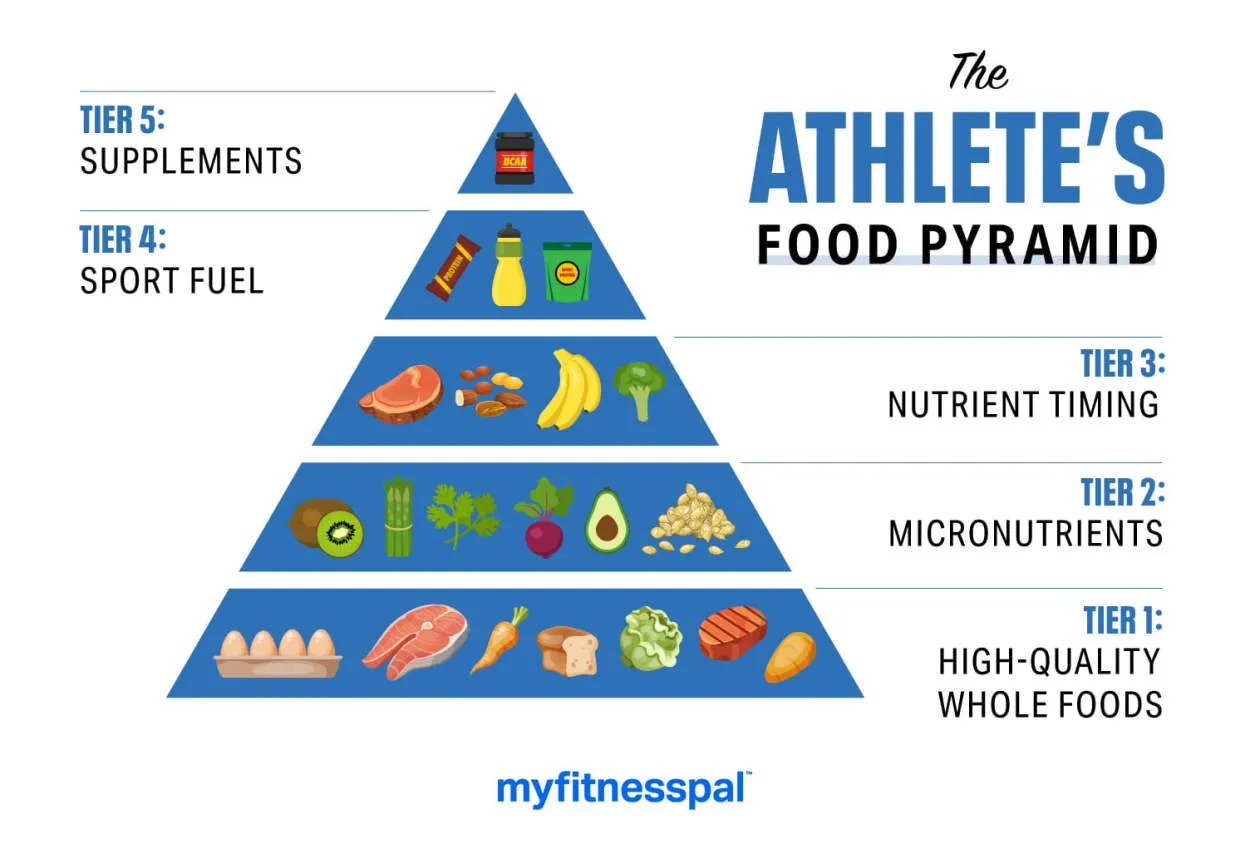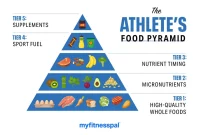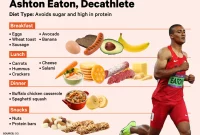Are you looking to fuel your body like an athlete? In this article, we will provide you with a comprehensive nutrition guide that will help you eat like a pro. Discover the key nutrients, meal timing, and healthy habits that will optimize your performance and support your fitness goals.
Creating a Balanced Athletic Diet
In order to optimize performance and support the demands of intense physical activity, athletes must fuel their bodies with a balanced and nutritious diet. A well-planned athletic diet can enhance energy levels, improve recovery, and boost overall athletic performance. Here are some key considerations to keep in mind when creating a balanced athletic diet:
1. Prioritize Carbohydrates:
Carbohydrates are the primary source of energy for athletes. Incorporate complex carbohydrates like whole grains, fruits, and vegetables into your meals. These will provide sustained energy and support endurance during exercise.
2. Include Adequate Protein:
Protein is essential for muscle repair and growth. Include lean sources of protein in your diet, such as chicken, fish, tofu, and legumes. Aim for approximately 0.8-1 gram of protein per pound of body weight.
3. Don’t Neglect Healthy Fats:
Fats are important for optimal hormone production and absorption of fat-soluble vitamins. Choose healthy fats from sources like avocados, nuts, seeds, and olive oil.
4. Hydrate Properly:
Maintaining proper hydration levels is crucial for athletic performance. Drink plenty of water throughout the day, especially before, during, and after exercise.
5. Fill the Nutrient Gaps:
Consider incorporating a wide variety of fruits and vegetables to ensure you’re obtaining all essential vitamins and minerals. If needed, consult a sports dietitian to identify and address any nutrient deficiencies.
6. Timing and Portion Control:
Eat balanced meals and snacks timed around your workouts. Prioritize carbohydrates and protein-rich foods before and after exercise to optimize performance and recovery.
Remember, every athlete’s nutritional needs may vary, so it’s important to listen to your body and work with a professional to tailor your diet to your specific sport and goals. By following a balanced athletic diet, you can fuel your body for success and achieve your peak performance on and off the field!
The Timing of Meals for Optimal Performance
In the world of professional sports, proper nutrition plays a crucial role in an athlete’s performance. One key aspect of an athlete’s nutrition plan is the timing of meals. By strategically organizing their meals throughout the day, athletes can optimize their performance and fuel their bodies efficiently.
Breakfast, often considered the most important meal of the day, should be rich in carbohydrates to replenish glycogen stores and provide energy for the day ahead. Including sources like whole grains, fruits, and protein will ensure a well-balanced breakfast.
Mid-morning snacks can be beneficial, especially for athletes with high energy demands. Opt for light options such as nuts, yogurt, or a piece of fruit to maintain stable blood sugar levels and prevent energy crashes.
Lunch should consist of a combination of carbohydrates, proteins, and healthy fats. Whole grain sandwiches or salads with lean proteins are excellent choices. Including vegetables and some healthy fats like avocado or olive oil will provide additional nutrients and aid in muscle recovery.
An afternoon snack is crucial to prevent hunger and maintain energy levels. Opt for a small, protein-packed snack like Greek yogurt, a protein bar, or a handful of nuts to keep hunger at bay.
Pre-workout meals or snacks should primarily focus on carbohydrates for quick energy. Consuming easily digestible options like a banana, whole grain toast, or a smoothie will provide the necessary fuel for intense training sessions.
Post-workout nutrition is vital for muscle recovery and replenishing energy stores. Including a mix of protein and carbohydrates within 30 minutes of exercise is ideal. Good options include a protein shake, a chicken breast with a side of quinoa, or a turkey wrap.
Dinner should be well-balanced and include a variety of nutrients. Lean proteins like fish, chicken, or tofu, paired with whole grains and plenty of vegetables, will provide the necessary nutrients for recovery and repair.
Finally, an evening snack can satisfy hunger and promote sleep. Opt for options like cottage cheese, a handful of nuts, or a small bowl of low-sugar cereal to satiate cravings.
In conclusion, the timing of meals plays a crucial role in optimizing an athlete’s performance. By focusing on nutrient-dense foods and distributing meals strategically throughout the day, athletes can ensure they are properly fueling their bodies for training, recovery, and overall success.
In the world of nutrition, there are numerous diet trends and fads that emerge and disappear. As an athlete, it is essential to navigate through these trends and focus on a nutrition plan that supports optimal performance and overall well-being.
1. Avoid Extreme Diets
It’s important to steer clear of extreme diets that promise rapid weight loss or exclude entire food groups. These diets often lack essential nutrients needed for athletic performance and can lead to muscle loss and fatigue.
2. Prioritize Macronutrients
Athletes should ensure their diet incorporates an appropriate balance of macronutrients: carbohydrates, proteins, and fats. Carbohydrates provide energy, proteins support muscle repair and growth, and healthy fats are crucial for hormone production and joint health.
3. Customize Caloric Intake
Caloric needs vary depending on individual factors such as body composition, training intensity, and goals. Consulting with a sports nutritionist can help determine the optimal calorie intake for your specific needs, ensuring you have enough fuel without overeating.
4. Eat Whole Foods
Focus on consuming whole, unprocessed foods such as fruits, vegetables, lean proteins, whole grains, and healthy fats. These provide essential vitamins, minerals, and antioxidants that support recovery, immune function, and overall health.
5. Hydration Is Key
Adequate hydration is crucial for optimal athletic performance. Aim to drink enough water throughout the day and during workouts to replace fluids lost through sweat. Electrolyte-rich drinks can also be beneficial for intense training sessions.
6. Individualize Supplements
While some supplements may enhance performance and recovery, it’s important to prioritize whole foods first. If supplements are considered, consult with a sports dietitian to ensure they align with your specific goals and needs.
7. Monitor Progress
Regularly monitor and evaluate your nutrition plan’s effectiveness. Keep a food diary, track performance improvements, and pay attention to how your body feels. Adjustments can be made accordingly to optimize your diet for maximum results.
Special Dietary Considerations for Athletes
Athletes have unique nutritional requirements to optimize their performance and support their overall health. Here are some important considerations for athletes when it comes to their diet:
1. Adequate Caloric Intake
Athletes require more calories than sedentary individuals to fuel their physical activities. It is crucial to consume sufficient calories to meet the increased energy demands and prevent energy deficits.
2. Carbohydrates for Energy
Carbohydrates are the primary fuel source for athletes. Including complex carbohydrates such as whole grains, fruits, and vegetables in meals and snacks can provide a sustained release of energy during exercise.
3. Protein for Muscle Repair and Growth
Athletes need adequate protein to support muscle repair, growth, and recovery. Including lean sources of protein, such as poultry, fish, eggs, and plant-based proteins, in their diet is essential.
4. Hydration
Maintaining proper hydration is crucial for optimal athletic performance. Athletes should drink enough fluids before, during, and after exercise to replace the fluids lost through sweat.
5. Micronutrients
Vitamins and minerals are essential for overall health and performance. Athletes should aim for a balanced diet that includes a variety of fruits, vegetables, whole grains, and dairy or dairy alternatives to obtain sufficient micronutrients.
6. Timing of Meals
The timing of meals and snacks is important for athletes to properly fuel their workouts and support recovery. Consuming a balanced meal or snack containing carbohydrates and proteins 1-3 hours before exercise can optimize performance.
7. Individualized Approach
Each athlete is unique, and their dietary needs may vary. It is essential for athletes to work with a registered dietitian or sports nutritionist to develop an individualized nutrition plan that considers their specific goals, training demands, and any dietary restrictions or food allergies they may have.
By paying attention to these special dietary considerations, athletes can ensure they are fueling their bodies optimally for training, recovery, and peak performance.
The Role of Cheat Days in an Athlete’s Diet
When it comes to maintaining a healthy diet as an athlete, the concept of cheat days often comes into question. Cheat days are designated days where athletes can indulge in their favorite foods that are typically considered unhealthy or non-nutritious. Although cheat days may seem counterproductive to an athlete’s nutrition plan, they actually serve an important role in their overall diet.
One of the main benefits of cheat days is psychological. Following a strict and disciplined diet can be mentally challenging and can lead to feelings of deprivation and restriction. Cheat days provide a sense of freedom and allow athletes to satisfy their cravings, which can help them adhere to their healthy eating plan for the rest of the week.
Cheat days can also have physiological benefits. Athletes often follow a structured nutrition plan that is focused on fueling their performance and promoting recovery. This typically includes consuming a high amount of protein, complex carbohydrates, and healthy fats. However, by incorporating occasional cheat days, athletes can enjoy foods that are higher in calories and simpler in composition. This can help replenish glycogen stores, boost metabolism, and provide a mental break from the rigidity of their regular diet.
It is important to note that cheat days should be approached with moderation and taken in stride with an athlete’s overall caloric needs. Excessive indulgence can negate the benefits and may lead to weight gain or negatively impact performance. Athletes should also prioritize the quality of their cheat day foods by opting for high-quality ingredients and limiting processed options.
In conclusion, cheat days play a vital role in an athlete’s diet. They offer psychological relief, allow for the enjoyment of indulgent foods, and provide physiological benefits. By including well-planned cheat days as part of their overall nutrition strategy, athletes can strike a balance between discipline and satisfaction, ultimately enhancing their performance and adherence to a healthy eating plan.
Conclusion
In conclusion, maintaining a proper nutrition plan is essential for athletes to perform at their best. By following the guidelines outlined in this article, athletes can ensure they are fueling their bodies with the right nutrients to support their training, recovery, and overall performance. Remember, a well-balanced diet that includes a variety of fruits, vegetables, lean proteins, whole grains, and healthy fats is key to achieving optimal athletic performance.




